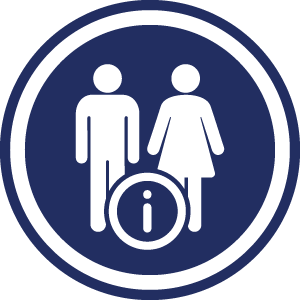Discover how nurturing adaptive behavior empowers individuals with IDD to live more independent, rewarding lives.
Adult High Risk Care Management
Program Details
 Mobile Psychiatric Rehabilitation (MPR)
Mobile Psychiatric Rehabilitation (MPR)
This program helps to develop skills and provides environmental supports an individual needs to be successful and satisfied with the living, learning, social and working environments of their choice. It provides one-to-one or group skills teaching to individuals who are in various stages of recovery. The program is individualized according to the wants, needs and life goals identified by the consumer through a collaborative planning process.
Mobile Medication Monitoring
This is a program designed to assist individuals in the community who have experienced difficulty in taking medication as prescribed. The services include assessment of needs in regards to medications and medication education, coordination of prescriptions, and medication monitoring.
Assertive Community Treatment Team (ACT)
This is a comprehensive and intensive 24-hour a day treatment utilizes a team of clinicians. ACT may encompass mental health, substance abuse, and rehabilitative services.
Partial Hospitalization
This is a structured day program provides an alternative to inpatient hospitalization that offers intensive support in an outpatient setting. Services include individual and group therapy and medication management.
Crisis Residential Unit (CRU)
This is a short-term unsecured residential facility to help individuals stabilize symptoms and avoid hospitalization. Services include individual and group therapy and medication management.
Residential Treatment Facility for Adults (RTF-A)
This program takes place within a facility providing 24-hour supervised care for up to 30 days. The program provides a safe and supportive setting as an alternative to inpatient mental health hospitalization or as a step-down from inpatient care. The facility also assists in managing the completion of normal, everyday routines that, under better circumstances, would not appear to be difficult. Treatment is tailored to meet each individual’s needs and goals through a holistic, multidisciplinary approach. Services provided can include psychiatry, nursing, individual and group therapy and case management.
Inpatient Hospitalization
This is a secure hospital setting for individuals with acute symptoms and/or needing to stabilize medications, as well as those who may be at risk of harm to themselves or others.
Drug and Alcohol Detoxification (Detox)
This is a program provided in a facility that includes 24-hour nursing care, medications for pain relief, and an element of therapy for the emotional challenges clients may experience during this initial phase of recovery after long-term substance abuse has led to chemical dependency on a toxic substance.
Drug and Alcohol Rehabilitation Programs
These are residential treatment programs where clients live on-site in a structured setting where they will receive education, therapy, and medical care to assist them in working through personal issues and ultimately overcoming their addiction. Treatment focuses on educating clients on the disease of addiction and giving them the tools and skills they need to be successful in recovery outside of residential treatment.
Halfway Houses
These are designed to meet the needs of individuals continuing to recover from addiction and provide a safe, clean, and understanding environment while clients work towards successfully transitioning back to their communities, jobs, and families following completion of a residential program. Individuals in halfway house programs participate in daily community meetings and AA/NA meetings and are trained in life skills and job readiness.
Recent Posts
Discover ECCM's housing stabilization services, transforming lives for individuals with IDD and behavioral challenges.
Discover the latest tools, strategies, and methods being used as a new treatment for autism care.
